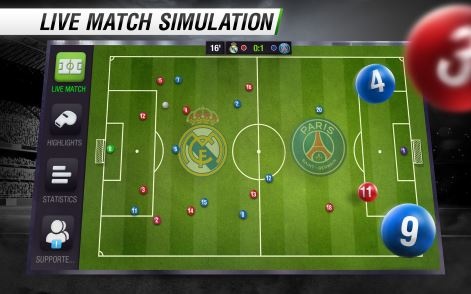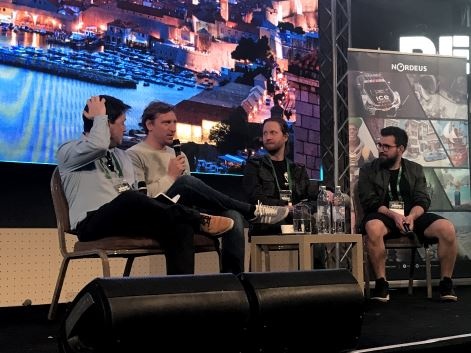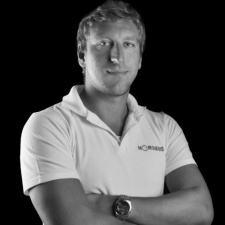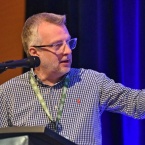There have been some big names in football management sims over the years. But devotees of the genre know Top Eleven is the current online and mobile heavyweight.
With Jose Mourinho as its celebrity figurehead, the title started on Facebook and then launched on iOS and Android in 2013. It immediately soared to the top of the charts and has been played by 150 million people, in every country around the globe.
To date, this phenomenon remains the only live title from Serbian developer Nordeus. Founded in March 2010 by Branko Milutinović (CEO), Milan Jovović (CCO) and Ivan Stojisavljević (CTO), the self-funded, Belgrade-based company has swelled to 160 team members on the back of Top Eleven. Now they're deep in development of Spellsouls, a fantasy battler soft-launched in eight territories.
Is it difficult to follow a triumph like Top Eleven? How do three guys from Serbia cope with growing a company in the international spotlight?
These are topics that CEO Branko Milutinović discussed on stage at Reboot Develop last month. He was on a panel called "Building Local Studios Into A Global Games Industry", and he was joined by Johan Sjöberg (Chief Product Officer at Paradox Interative) and Almir Listo (Global Brand Director at Starbreeze Studios) who shared their experiences with attendees at the Croatian conference.
Immediately following the panel, we sat down with Milutinović and pressed him for advice he might have for young teams going through similar experiences...
PocketGamer.biz: How did you get started in the business? Were you always a gamer?
Branko Milutinović: Yes, I was. Let’s go back to my childhood - let me lie down on the couch [laughs]. I was always attracted to a lot of different things. And I still am. That’s why focus is so important to me. And one of the things I was attracted to was computers, and of course games.
I think I was five when I got the first Spectrum. I still have it. I was in love with that. But I was also in love with sports: I was a failed athlete! And I also liked science a lot. So I ended up getting a masters in computer engineering. Since childhood, I’ve been practising all three. I would be at school, and then outside, and then games.
I played every sport game there was. Management, action-simulation, whatever. I remember, one day on a Sega Mega Drive, because I couldn’t save my progress, I played NBA Jam for 23 hours consecutively with my friend. We played the entire season and then the playoffs, 86 games, my god! But I played a lot of simulations as well, strategy games, Civilization for instance – amazing.
So: school, and then outside, and then games. And then no sleep! And this all led me to the gaming industry. The combination gave me the idea to start the company. I was a computer engineer working at Microsoft as a developer (still playing games and still playing sports). It just felt so good to combine them.
I love building stuff. With the help of a lot of friends, we started a gaming company, to build sports games. So it was kind of natural from that perspective… but also hard to do!
So you guys get together, you launch a company to do sports games. What’s the first thing you discover?
It makes sense. Logically speaking, we were idiots.
The real lesson I learned is how devoted you need to be, and how much of yourself you need to put into what you do, if you want to really beat the odds.
Everyone told us we were idiots! It makes sense. Logically speaking, we were idiots. Because how often do three kids from Serbia start a gaming company that succeeds to this level? Never. But at the same time, we felt what we were doing makes sense.
I think that was the first lesson. You just do it, devote yourself to it, and believe what you’re doing makes sense.
What was the gaming scene in Serbia like?
It's much better today than it was then. We contributed, definitely. I don’t want to take all the credit but we played a role, along with many other people.
So now it’s much better, and I really hope it’s going to become one of the regions – including Croatia – where game developers are mainstream. There are a lot of success stories. A lot of talent is working hard and fighting for funding and the opportunity to do something big.
As a new, Serbian company, was it hard to get funding when you started out?
To be honest, we were never looking for funding. We never raised any money.
But I do know that we weren’t really approached by anybody. Some conversations that we did have were very cold. You could see that. So I think it was hard, and I think it still is. I also think that gaming is hard to get money for, because it has to be a business opportunity at the end of the day, and I assume the risk is high for investors.
But on the other hand, my experience is that developers are really people that believe in what they do. They do it because they want to do it. They could do something else and have an easier life and make more money! So they’re enthusiasts.
So I believe that if I were an investor (which I’m not, but if I become one, one day) I believe these are actually the people you should be giving money to. Because all they need is that. They want to do everything else.
I think that’s going to change for Serbia as well. It’s much better obviously in the US.
Once you had a success, what were the next problems you faced? What’s been the challenge of expanding?
To repeat the success – that’s the ultimate challenge.
To repeat the success - that’s the ultimate challenge.
We started Nordeus with the idea to build a gaming company, not to build one game and sell it, or do something and then "let's see". I remember in the early days, people would ask, "You’ve got this game! Are you now going to do publishing? Are you now going to develop other software?" No, no, no! We want to be a gaming company! We want to build games. Because at the end of the day, that’s what makes us happy.
One challenge was to scale the company and bring in the right people; to make sure they stay and that they’re able to do more, together, with us, and then continue to do that. Build and evolve and keep a very cool culture. Now, I know you're thinking, "Blah blah blah": I don’t want to sound like a cliché! But for us, it was important that we were feeling good with the people we were working with. That's a challenge: how to do more, grow much faster, and combine that with feeling good about yourself, about the people you work with?
I realised, that for the first time in my Nordeus life, over the last six months I actually feel like we know what we’re doing – seriously – and I feel that these people that work with me, they also know what we’re doing; they know how to do it; and they’re going to be with us until we get it right.
It’s an interesting moment. It’s probably a pattern that every company after five years gets to. Maybe some managers don’t talk about it. But for me, that's the moment we’re in now. So now I feel like super-positive about taking on the challenge: "How do you grow, and stay true to yourself, and happy?"
You developed the most popular mobile sports game of all time. This means the spotlight was suddenly on you guys. How did that feel? Was that intimidating?
That’s a great question. I wouldn’t say it was intimidating, but it was definitely not helping us focus [laughs]. Again, I’m not saying it’s a distraction in a negative way, but it adds another layer of complexity and things you need to do that you haven’t really done before. But it’s normal. It’s part of growing up. We're becoming young adults [laughs]!
I really look at Nordeus and my role as a founder there and the journey so far – we're at the "growing up" stage. We know what we want and how to do it, but we don’t really have the experience and haven’t really done it that many times before. That’s how I feel.
Are you surprised when you come across fans of your game from all around the world?
It’s part of their life in a very subtle enriching way. It’s a hobby. It's positive.
We used to be. But now we’ve got used to it. That’s one of the beauties of the business. We have very consistent feedback from Top Eleven users.
You go and ask the guys who’ve been playing for more than three months, and it’s always the same: "Yeah, so I wake up. First thing I do, I fire up the app. Then I see what happens. I’ll do two minutes, some subtle changes. Then I wait for my match. That’s it. Then I go again, I play." It’s like it’s part of their life in a very subtle enriching way. It’s not doing any harm. It’s a hobby. It's positive.
We do everything, like process everything, model everything, code everything, test everything. We need to pay for it. And then, if it’s good, we give it to the world, and we don’t charge them anything. And then we do additional work – which is huge – to make people aware that there’s this product that we made for them that they can play for free. It sounds crazy!
And as they’re playing, you ask them to spend something money here; to have whatever experience they want. And then, believe or not, a percentage of them does this – even though they don’t have to. With free-to-play, people make a decision, on their own, to give you money. Most of them repeat that decision for years. So it’s very cool. The only way you can do that is because people actually want to consume what you do.
You said in your panel, "We were small and humble, but now we're mid-sized and humble!" Is humility one of your core values?
Self-awareness. Absolutely. You know assholes can be assholes in many ways, but usually it's from a place of not being self-aware. So yeah, self-awareness is super-important for us. I think that’s the root of people striving to be better and learn. It’s very, very, very cool to have that in anything you do.
On your panel you spoke about company culture, and about guys at your workplace who play football...
Yeah, in football you can see the guy who’s not personable. He’s trying to score from over here - he must be thinking he’s Ronaldo, and he’s not. This is a joke, but actually it relates. I'm joking when I talk about introducing football as part of an interview, obviously! But there is something about how your personality shows while you play sports.

So what advice would you give to another company starting out small?
Believe in themselves, because nobody else will. That’s very important. Team is important every time, but it’s even more super-important at the beginning. When it’s really hard, very stressful, and nobody is proven yet, and there are financial uncertainties and there is no real life balance. It’s really hard, especially then. The team needs to be right.
I am so lucky that the team that I started this company with is a team that really works together. They knew each other for half of their lives. It helps. I’m not saying it’s like a recipe. I’m sure there are examples of people just meeting! But you need to share the values on day one. You need to be trusting each other. So I think it’s important who you start with.
As for business advice? (This is in hindsight, because we had absolutely no idea!) But in business: I think you need to pay attention and when everyone’s zigging, you should zag. A new company needs to find something different, do something new. If you’re trying to build a better FIFA and you’re three guys – it’s unlikely. It might happen, but it’s unlikely! So try to do something new. Whatever happens you’re going to learn a lot.
Tell us what you're working on right now.
Spellsouls. That’s heavily in development. It’s in super-early soft launch. We're working to complete that project, and launch it. Then at the same time, we’re in the early stage of one more thing.
The way we think about our portfolio is: it’s adjacent. We’re definitely staying in sports, for sure. But not necessarily every product we do is going to be sports. It might be adjacent. The way we approach mobile games is speaking about what is common for them. It’s the competitive, male, football fan. That’s usually sports, but it can also be Spellsouls. It can be cars. It can be different things.
What are your influences on Spellsouls?
With Spellsouls, we made ourselves a bet to try to be a mobile company that spearheads into the AAA world. We said, "We want to be a premier game-making company. We can’t do that by only having football management simulations. We need to be able to build amazing experiences which are also visual." It was a big commitment.
A company our size cannot compete by copying something which already exists.
We were conscious of the user experience. It needs to feel familiar. But at the same time, I massively believe a company of our size cannot compete by copying and improving something which already exists. EA can do that. But I don’t think we can do that.
We need to be unique and Spellsouls just followed that thinking. (It was even more so a year and a half ago, when we had it, but over time the market has seen some other games which are more similar!)
Some of the concepts are, I will say, improvements from other genres. It’s a blend of the familiar, but it’s really innovative. I think we’re going to continue down that path and try to fight for our place under the sun by offering an experience that’s familiar but really unique.
What’s 2017’s biggest challenge going to be? What’s the big battle right now in mobile games?
Continuing from what we’ve seen in the previous years, I think the entry bar is higher in nearly every aspect. The market’s competitive, which adds additional challenges. I think there are a lot of other opportunities as well, which makes you wonder what you should be doing with your time and resources. So a lot of people are going to VR and AR. But there’s consolidation, it’s harder to compete, a higher bar.
You’re not tempted to experiment with VR?
We built our first VR game! We've experimented with it a lot. One day…! We’re building the capability, I would say. But let’s see. We’re really focused on Spellsouls and then something else, and then along the way, we’ll see how it goes.
So what makes you most optimistic about the games industry today?
The people that work in the games industry. I think some of the greatest people I know, I’ve met in the games industry. They are amazing. That’s what keeps me optimistic. Maybe I’m just a crazy, naïve optimist and an idealist, but I think it’s an amazing industry to be in versus most others.
Also I think the demands of the audience for games is not something that will go away – ever. That keeps me super-pleased. There’s always going to be an entire planet waiting for things to play and try. That brings me happiness, overall.

Read more about Branko Milutinović and his team, plus ongoing projects and recruitment at Nordeus, at the official website. There are official sites for Spellsouls and Top Eleven too. 2018's Reboot Develop will take place April 19th-21st again, at the Sheraton on the coast outside Dubrovnik.






















